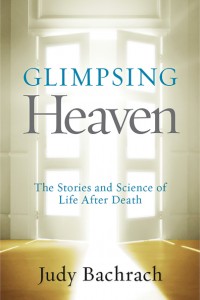
For most of your life, you’ve been told that you must be good.
There’s an eternal reward, a Promised Land for those who behave. Mind your elders, be good, stay out of trouble, and you’ll go there. If not, well…
So what will that wondrous place be like? Religions teach various things, all of them paradisiacal, but what’s the truth? Science has theories, says Judy Bachrach, but in her new book “Glimpsing Heaven,” the once-dead have knowledge.
For much of her life, Judy Bachrach was afraid of death and the dying. It wasn’t much of a problem when she was younger but when her mother was diagnosed with Alzheimer’s, Bachrach knew she needed to face her fears. She began researching death, and what happens after we die.
According to the Hollywood version of what used to be called near-death experiences (a term that’s fallen somewhat out of favor), a person’s heart stops, they travel through a tunnel toward a beautiful, bright light but are told they must return. It seems clichéd, but it’s not: of patients who’ve had death experiences, that’s the format most often reported by those willing to discuss it. Perhaps not surprisingly, the majority of experiencers prefer to keep mum.

Scientists admit, however, that there’s plenty they don’t know; for instance, death travelers (as Bachrach calls them) often inexplicably encounter after-effects such as precognition. They report “un-asked-for gifts” that may seem new-agey, but are real and documented. They also have higher-than-expected divorce rates.
Death experiences (or lack thereof) aren’t predicated on how death occurred. Travelers may encounter people they knew on their journeys, but are equally likely to see strangers. Belief in God is not always necessary for a blissful death experience.
And, truth be known, not all experiences are blissful…
We are all dying, right now, a little bit, every day. So what are we afraid of? That’s just one of the intriguing questions that author Judy Bachrach poses.
But first, I found “Glimpsing Heaven” to be a bit stiff (no pun intended) and not unlike myriad other books on this subject. I was, quite frankly, somewhat bored until Bachrach started throwing some interesting stats around and, by the time her narrative turns a little dark, I was hooked. Because it shows both the upside and downside to death experiences, I ended up liking this book quite a lot.
What allows me to recommend it, though, is that it doesn’t profess to have the definitive answer to “What happens after we die?” The words “We don’t know” resonate strongly through “Glimpsing Heaven,” leaving readers to draw their own informed conclusions – and that makes this a very good book.
The Bookworm is Terri Schlichenmeyer. Terri has been reading since she was 3 years old and she never goes anywhere without a book. She lives on a hill in Wisconsin with two dogs and 12,000 books.
